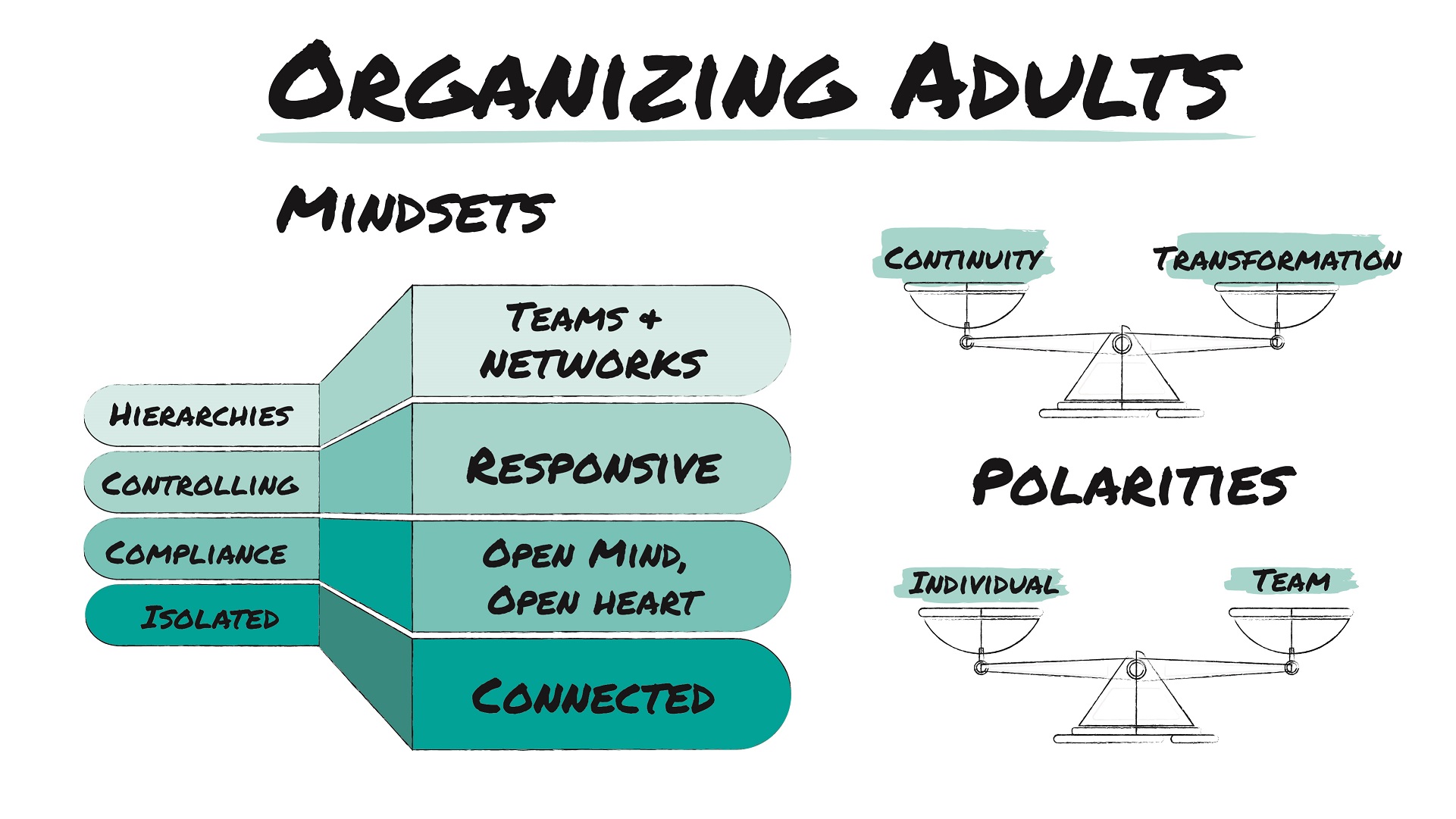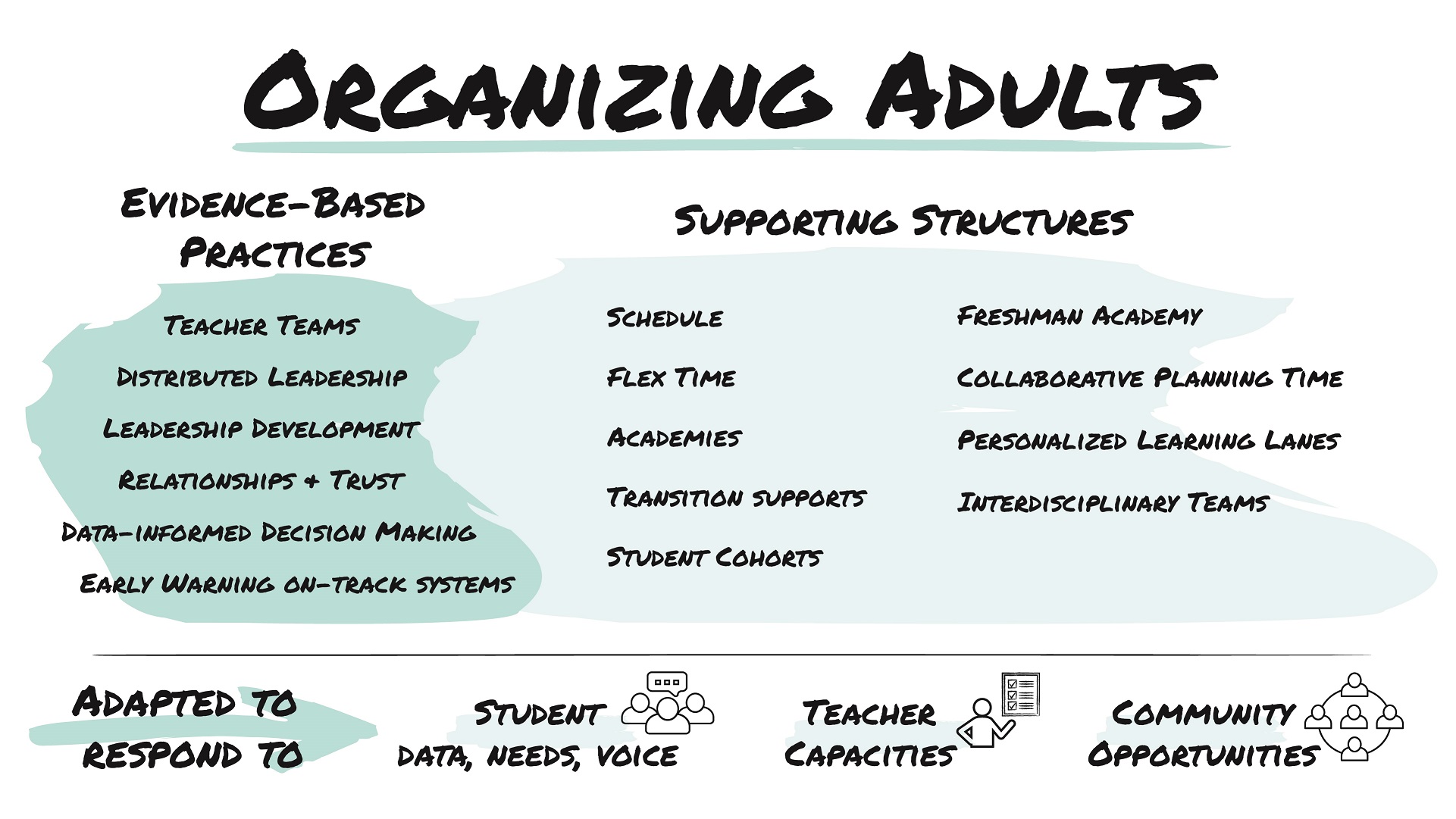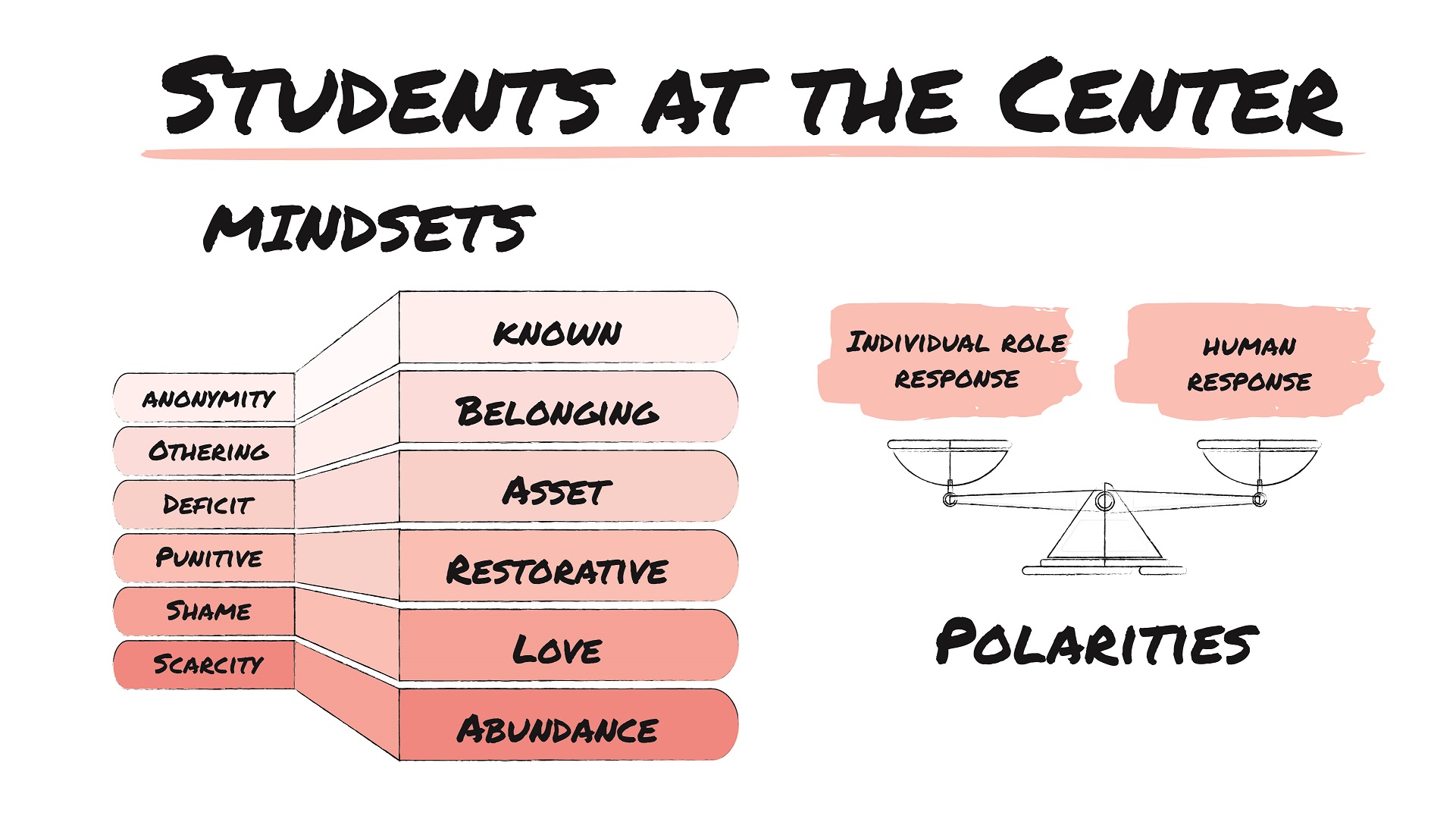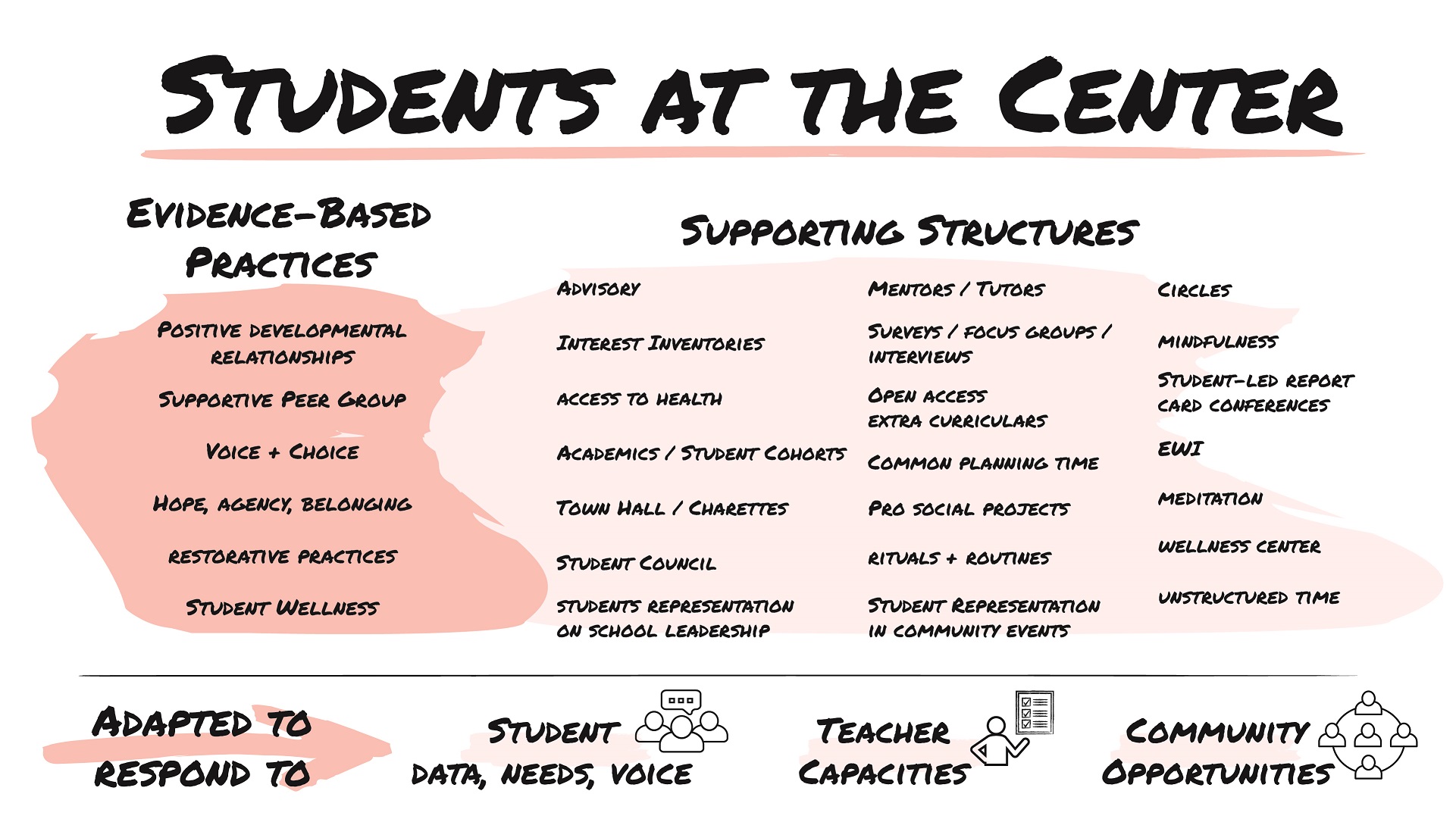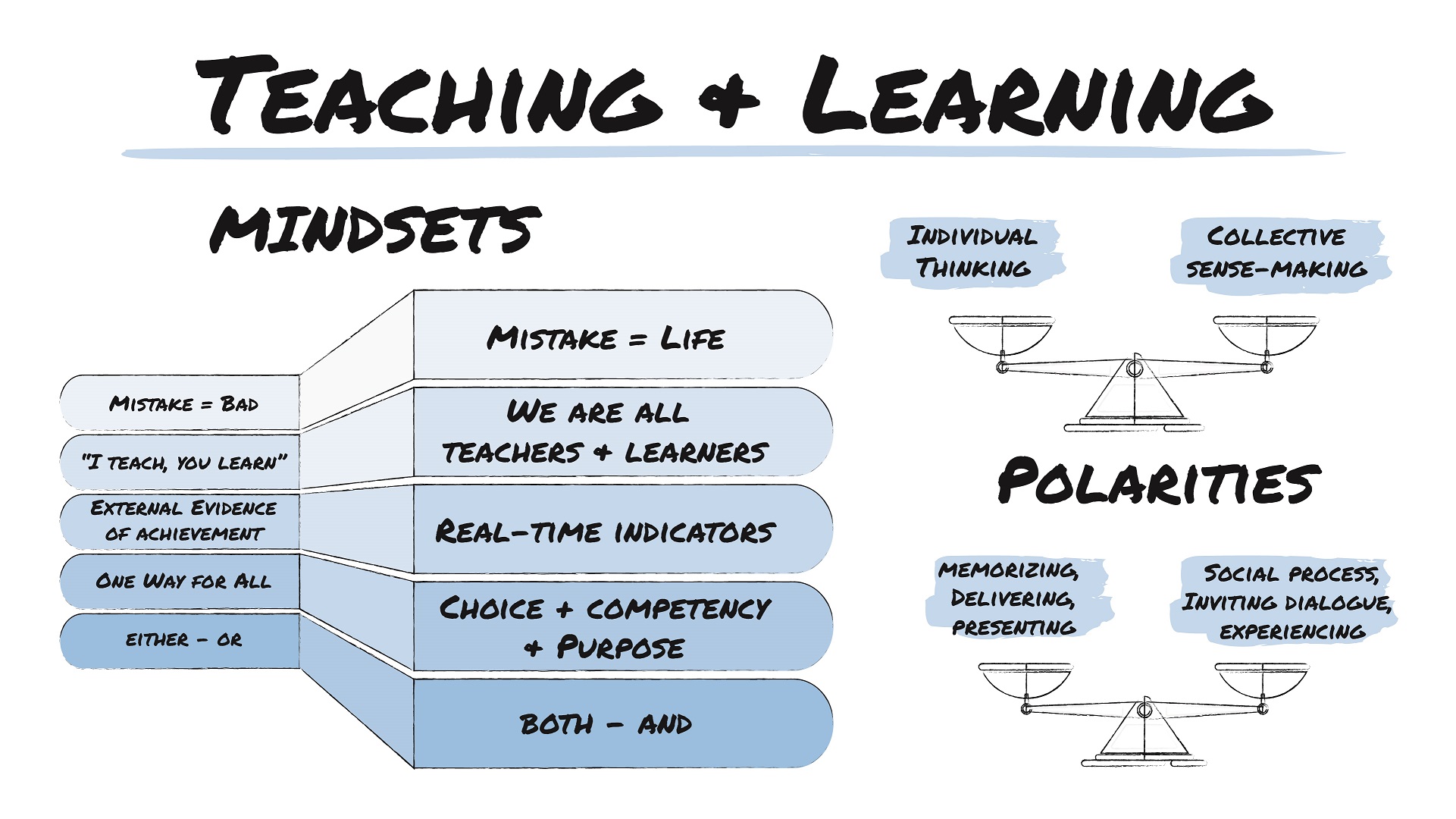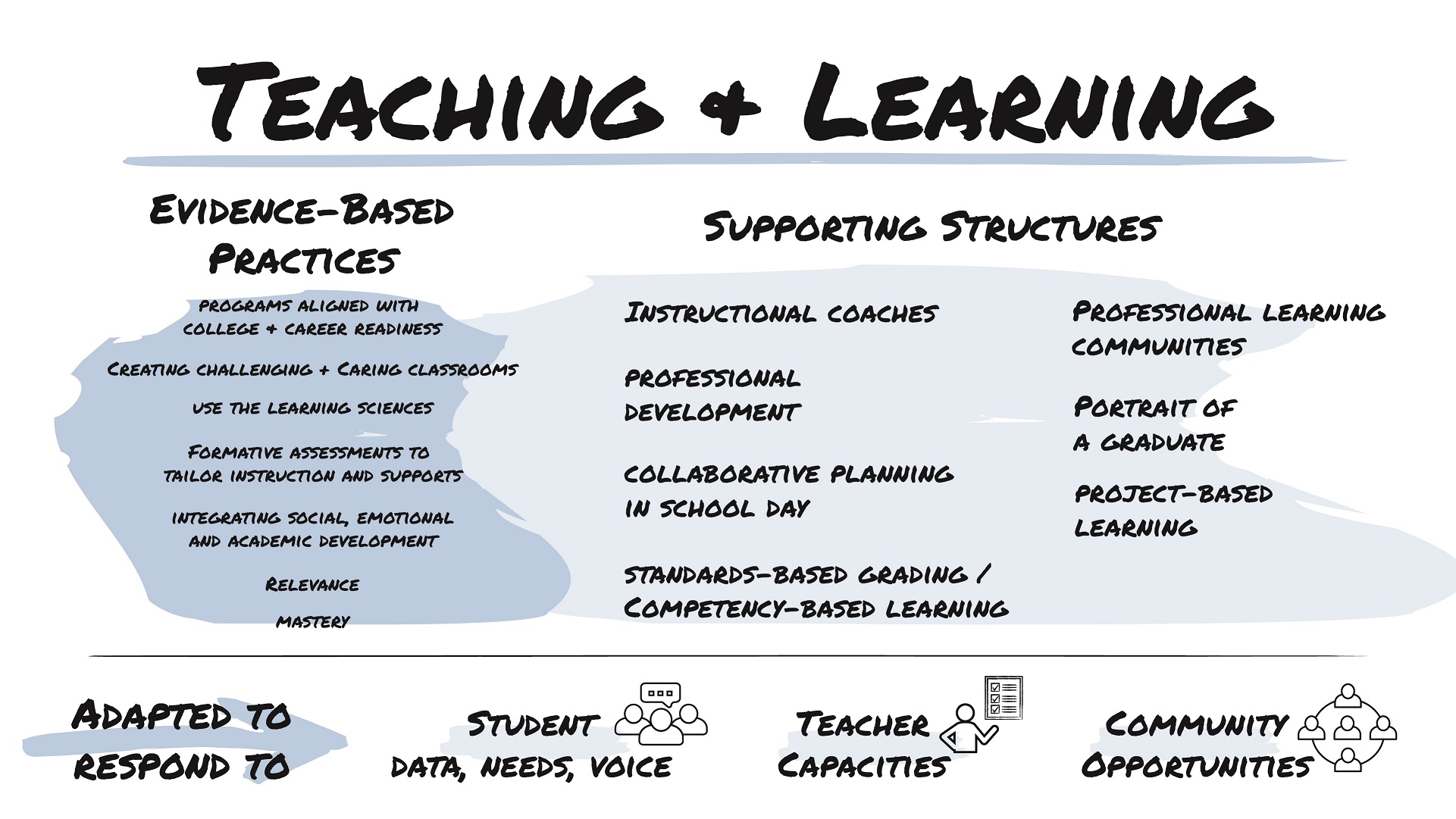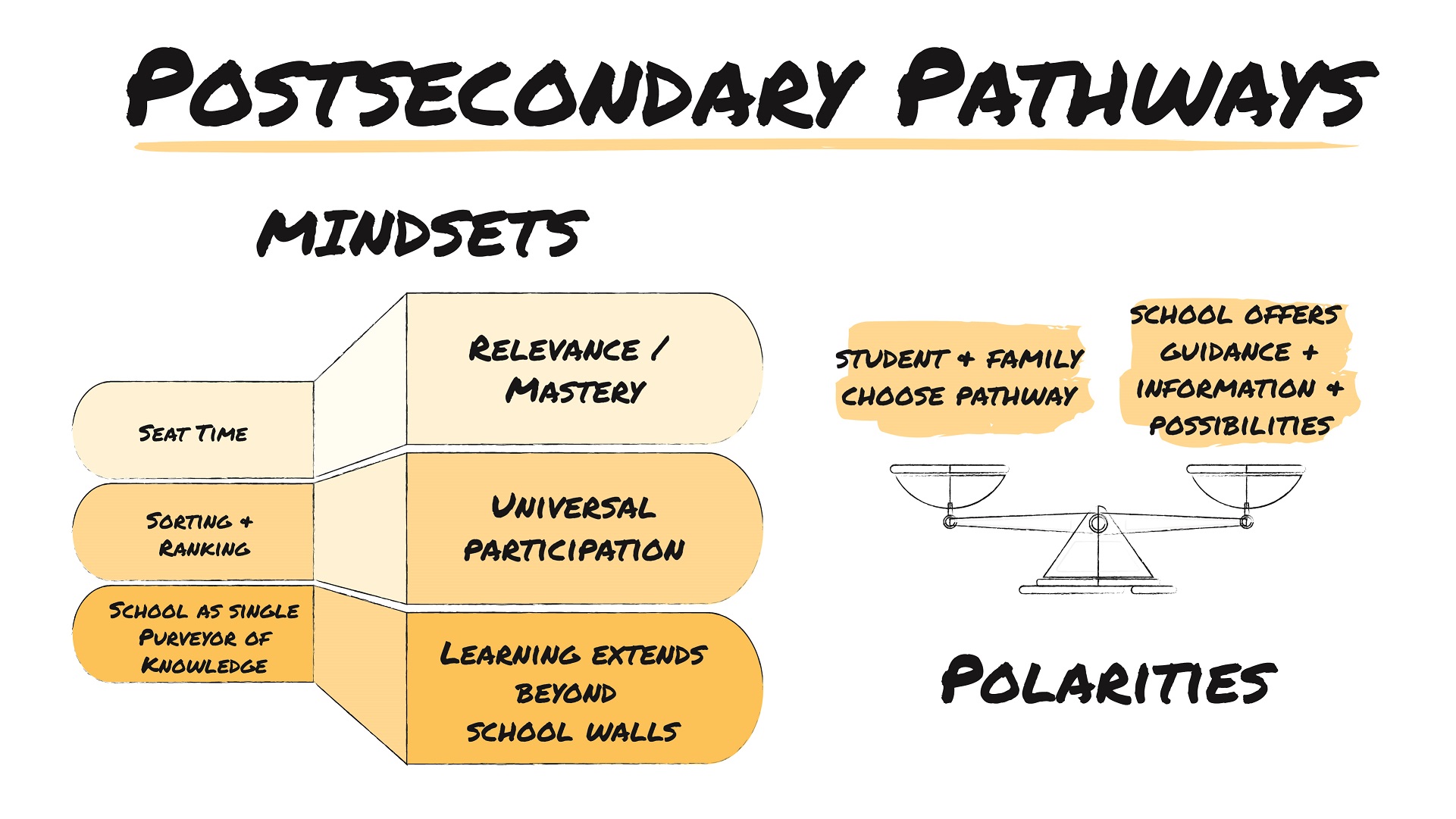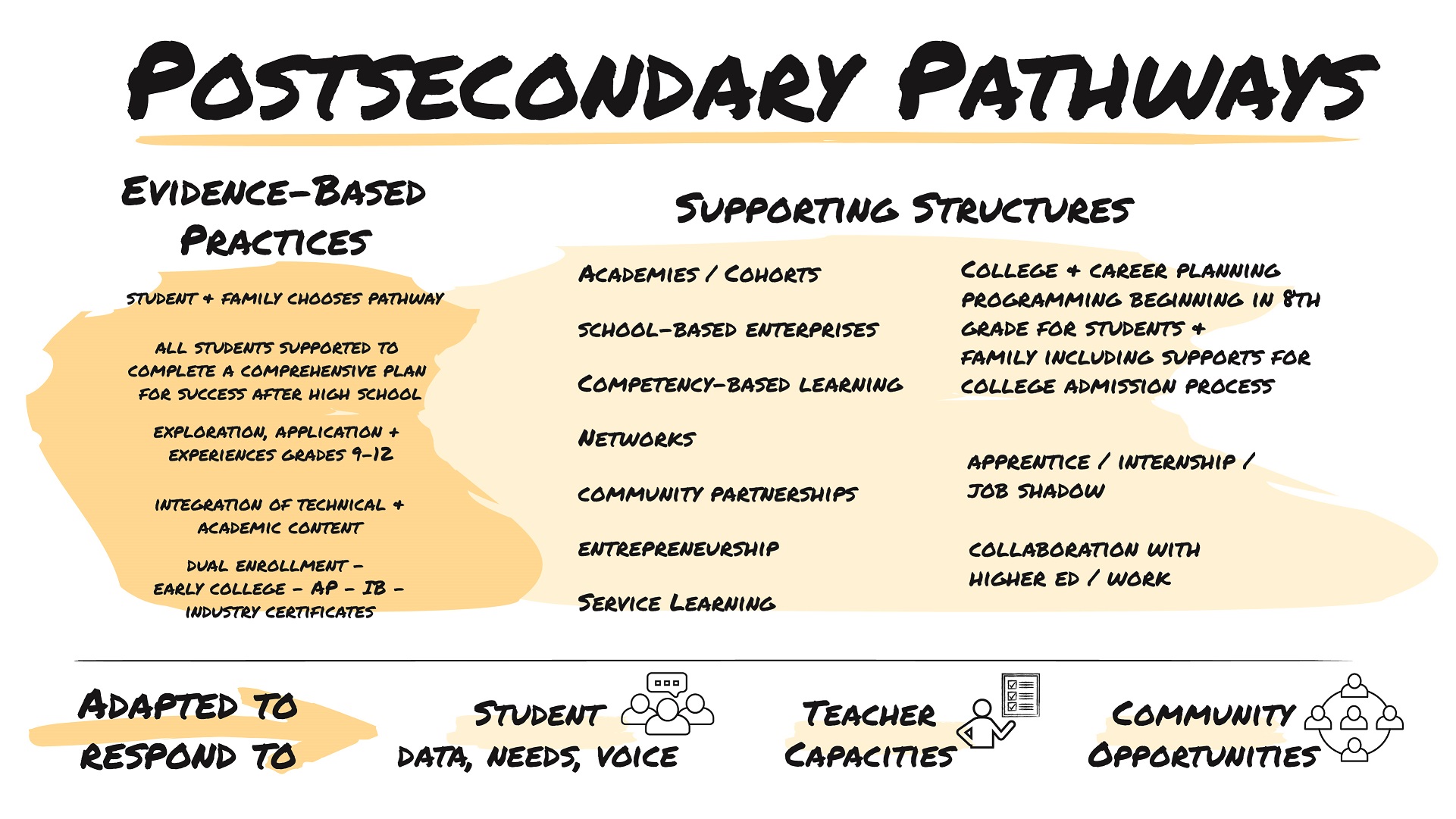Videos
The 9th Grade Summer School
A free program for students entering ninth grade. Students will gain valuable skills to prepare for attending high school. This one-minute video demonstrates how Phoenix Union High School provides transition supports in a summer Freshman Academy.
TEDx Talks: Getting Relationships Right
In this talk, Dr. Kent Pekel shares five essential actions that adults can take to build developmental relationships with young people in families, schools, programs, and other settings.
Success Team in Action at Hancock High School
This 32-minute video provides insights into a high school Success Team facilitating an accountable conversation about student outcomes using data and structured protocols.
Freshman Academy at Revere High School
This 32-minute video provides insights into a high school Success Team facilitating an accountable conversation about student outcomes using data and structured protocols.
See how Revere High School, located just outside Boston, MA, is addressing academic achievement and cultivating school culture by focusing on the 9th-grade year. Read more.
Podcasts
Teacher Teams
A six-minute audiocast cohosted by Dr. Robert Balfanz, Director of the Everyone Graduates Center at Johns Hopkins University and Linda Muskauski, Knowledge Development Director at the Everyone Graduates Center at Johns Hopkins University. The pair discuss how teacher teams serve as the building blocks for high school redesign initiatives.
Videos
Can Dropout Factory Research Save a COVID Generation
EJ Carrion interviews Robert Balfanz to get his perspective on the most recent report from the National Student Clearinghouse that showed that college enrollment for low-income high school graduates declined by 29.2 percent. Read more.
The Power of Believing That You Can Improve
Carol Dweck researches “growth mindset” — the idea that we can grow our brain’s capacity to learn and to solve problems. In this talk, she describes two ways to think about a problem that’s slightly too hard for you to solve. Are you not smart enough to solve it … or have you just not solved it yet? A great introduction to this influential field.
Engaging Student Voices in Redesign
A group of urban high school students from Baltimore, MD work together in four groups to design a 21st Century high school.
Report Card Conferences
Report Card Conferences are held between students and non-school affiliated adults. Caring adults, which are typically caring adults from the community, review a student’s report card along with their Attendance, Behavior, and Course Performance. RCCs give students the opportunity to speak with caring adults who reinforce the value of success in school and encourage them to get help when experiencing difficulty.
Students’ Voices/Students’ Visions
High School students from a high school in Northwestern Baltimore City discuss four high school redesign topics.
- School Design
- Learning
- School & Community
- Business & Wealth
The Education of Omarina
PBS FRONTLINE picks up the story of Omarina Cabrera, who was struggling in middle school when viewers first met her in 2012. The intervention of teachers helped her find her footing and find a place in an elite New England private school. Now, she heads to college.
Redesigning Student Supports
Redesigning Student Support Systems is a six-minute video which examines how high schools can redesign their student support systems using the A-B-Cs of Attendance, Behavior and Course Performance.
Staffing for Student-Centered Learning
Decisions about recruitment, hiring, and training teachers are central to creating success. Produced by our redesign partner XQ Superschools.
Student-Centered Learning: Building Agency and Engagement
This video from the Edutopia Schools That Work series shows student-centered learning at work at Maloney High School in Meriden Public Schools in CT. Teachers discuss their role as facilitators and detail how student-centered learning tactics are used in their classrooms.
Podcasts
Student Agency & Engagement
https://soundcloud.com/xq-expert-series/episode-4-student-agency-engagementStaffing for Student-Centered Learning
https://soundcloud.com/xq-expert-series/episode-4-student-agency-engagementStudent Agency & Engagement
Michele Cahill hosts a discussion with experts about how to co-create learning experiences with young people. Featuring: Travis Bristol, Research and Policy Fellow at the Stanford Center for Opportunity Policy in Education; Zak Malamed, Founder and Executive Director of Student Voice; Eliza Jane Schaeffer, Senior at Henry Clay High School.
Staffing for Student-Centered Learning
Betsy Arons, Geneviève DeBose, Hillary Salmons, and Michele Cahill answer questions and discuss ways to find and retain the best talent for your school. Featuring: Betsy Arons CEO of Urban Schools Human Capital Academy Geneviève DeBose National Board Certified Teacher and Commissioner of National Commission on Teaching and America’s Future Hillary Salmons Executive Director of Providence After School Alliance.
Videos
XQ Superschool: Teaching & Learning
Michelle Cahill hosts a discussion with principals on the topic that every young person in every neighborhood deserves the chance to learn in deep and powerful ways.
XQ Superschool: PSI High
PSI High is an immersive, full-time program located within Seminole High School where students work in an environment that looks like a high-tech office instead of a classroom. Rather than learn through traditional instruction, our students join teams with their peers and teachers to solve real community, business,
and social problems.
The guide, Design Your Personal Learning Plan, from Problem Solving Incubator High School in Seminole County Public Schools provides an example for creating an individualized learning plan that combines face to face classroom experiences, individual advisors and project- based learning experiences across the school campus and community.
Download the Guide (PDF)
Sandborn Regional High School: Competency-Based Learning
Sandborn Regional High School produced a nine-minute video focusing on their Competency-Based Learning program.
Does Early College for High School Students Pave a Path to Graduation?
From PBS Newshour. In a Texas border town where nearly all high school students live in poverty, the school district is trying an experiment to get more kids into college. Instead of waiting until students graduate to enroll them in higher education, the school is pairing with a local college to offer courses for free. Hari Sreenivasan looks at whether this method for closing the college graduation gap is working.
Technology & Learning for an Interconnected World
Technology can help personalize instruction and prepare students for the future of work.
Equity in the 21st Century
Our experts discuss how to make equity central to all decision-making at the school and district level.
Podcasts
School Mission & Culture
https://soundcloud.com/xq-expert-series/episode-4-student-agency-engagementStaffing for Student-Centered Learning
https://soundcloud.com/xq-expert-series/episode-4-student-agency-engagementSchool Mission & Culture
Michele Cahill hosts a discussion with experts about how to build equity into 21st century learning environments. Featuring: Arva Rice President and CEO of the New York Urban League Sonja Santelises Vice President for K-12 Policy and Practice at the Education Trust Uri Treisman Professor of Mathematics and Director of the Charles A. Dana Center at the University of Texas, Austin.
Staffing for Student-Centered Learning
Betsy Arons, Geneviève DeBose, Hillary Salmons, and Michele Cahill answer questions and discuss ways to find and retain the best talent for your school. Featuring: Betsy Arons CEO of Urban Schools Human Capital Academy Geneviève DeBose National Board Certified Teacher and Commissioner of National Commission on Teaching and America’s Future Hillary Salmons Executive Director of Providence After School Alliance.
Videos
High School 2022 A Day in the Life
High School 2022 is a district-wide initiative to design, refine and deliver the future of high school for graduates in the class of 2022 and beyond. The Virginia Department of Education is currently developing the Profile of a Virginia Graduate, a framework that will be used for the State Board’s revision of high school graduation requirements for students graduating in the class of 2022. High School 2022 in Albemarle County, Virginia will be influenced and responsive to the Profile of a Virginia Graduate. Click to visit ACHS’s website.
Click here to watch a video about Profile of a Virginia Graduate featuring Billy K. Cannaday, Jr., President of VA’s Board of Education.
Mississippi Today: Vicksburg Warren School District, MS
Gabriel Austin examines Vicksburg Warren School District’s efforts of a new pilot program that exempts it and two other school districts from some state laws to allow schools to be more innovative in tackling the challenge of achievement gaps, particularly between white and minority and low socioeconomic status students and their peers.
Iowa Big
This program attracts students from across Cedar Rapids, Iowa, because it provides the opportunity to earn high school credit by working on real-world projects designed by students, businesses, non-profits and government agencies. While working alongside local businesses and experts, Iowa BIG provides students a canvas to develop and engage with projects that have a profound impact on their own community. For this, they received the XQ award for turning the community into a hub of learning.
Podcasts
Student Agency & Engagement
https://soundcloud.com/xq-expert-series/episode-4-student-agency-engagementMeasuring Progress Toward College & Career Readiness
Michele Cahill hosts a conversation with three experts on how to measure and evaluate performance in schools. Featuring: Andy Calkins Deputy Director of Next Generation Learning Challenges Karen Pittman CEO of Forum for Youth Investment Antonia Rudenstine Co-Director of reDesign.
The Everyone Graduates Center at Johns Hopkins University School of Education produced and eight-part video training series in partnership with the New Mexico Public Education Department, and the High Plains Regional Education Cooperative.
The videos, materials, and activities are offered free-of-charge and designed to assist school teams in planning,
designing, implementing, and problem solving an Early Warning System.
The eight-part series includes:
- Overview of an Early Warning System (Video 1)
- Building a Data Culture (Video 2)
- Linking Indicators to a Tiered Intervention System (Video 3)
- Planning for Your School or District (Video 4)
- Getting Started (Video 5)
- Lessons Learned (Video 6)
- Intervention Review & Data Gap Analysis (Video 7)
- Introducing Early Warning System to School Faculty & Staff (Video 8)
We encourage you to watch and complete these activities with a representative team from your school that will be leading your Early Warning System implementation.
The team could include:
- At least one administrator
- At least one teacher
- A counselor
- An individual who excels at using your student information system
- And other school leaders or representatives
Videos
Video 1: Early Warning System Introduction
Video one offers an introduction and overview of an Early Warning System, functions, teams, and the Early Warning Indicators (EWI) meeting.
Estimated Module Time:
20-25 minutes
Video Running Time:
15 minutes
STEP ONE: Download Video Viewer’s Guide.
STEP TWO: Watch video and complete the activities.
Video 2: Building a Data Culture
Video two focuses on setting up EWS data systems including, background information on key pieces of data, suggestions for organizing the data, and recommendations for creating focus lists to help an EWS team respond.
Estimated Module Time:
20-25 minutes
Video Running Time:
20 minutes
STEP ONE: Download Video Viewer’s Guide.
STEP TWO: Watch video and complete the activities.
Video 3: Linking Indicators to a Tiered Intevention System
Video Three focuses on how to link indicators to a multi-level, tiered intervention system and explores effective interventions.
Estimated Module Time:
45-50 minutes
Video Running Time:
35 minutes
STEP ONE: Download Video Viewer’s Guide.
STEP TWO: Watch video and complete the activities.
Video 4: Planning for Your School or District
Video Four focuses on building an EWS team(s) in your school; analyzing data and examining trends; organizing and holding EWI meetings; and how to best develop actions plans.
Estimated Module Time:
30-35 minutes
Video Running Time:
20 minutes
STEP ONE: Download Video Viewer’s Guide.
STEP TWO: Watch video and complete the activities.
Video 5: Getting Started
Video five focuses on getting an EWS started, identifying a point person and team, lessons learned from early adopters, and ideas for further exploration and development.
Estimated Module Time:
15-20 minutes
Video Running Time:
12 minutes
STEP ONE: Download Video Viewer’s Guide.
STEP TWO: Watch video and complete the activities.
Video 6: Lessons Learned
The sixth video examines insights and lessons learned from successful Early Warning Systems adopters. The video shares a few trends that have arisen and examples of how they have been addressed by different school throughout the nation.
Estimated Module Time:
20 minutes
Video Running Time:
20 minutes
Note: There is no Viewer’s Guide for this video.
Video 7: Intervention Review & Data Gap Analysis
The seventh video focuses on interventions, which we are describing here as the supports and activities that are being completed for a particular student or group of students. The videos also examines how school teams can collect data on the interventions that have been implemented and engage in a regular review process to identify gaps, align interventions, examine impacts and ultimately improve the supports that are being provided to students.
Estimated Module Time:
15-20 minutes
Video Running Time:
12 minutes
STEP ONE: Download Video Viewer’s Guide.
STEP TWO: Watch video and complete the activities.
Video 8: Introducing EWS to School Faculty & Staff
This final video of the eight-part series focuses on successful EWS implementation that relies upon a multi-level support structure with the whole school being organized to support students’ success in Attendance, Behavior and Course Performance. This can range from the organizational structure, the safety of students in hallways, to the type of learning that students are engaged in during their courses and must be designed particular to the students in your school.
Estimated Module Time:
12 minutes
Video Running Time:
120 minutes
Note: There is no Viewer’s Guide for this video.
A podcast hosted by Robert Balfanz,
director of the Everyone Graduates Center.
Conversations with leaders in education from around the country on bold new ideas and research-based strategies for redesigning American education to more effectively engage all students and equip them for the challenges of today’s workplace and world.
In this episode, Dr. Balfanz is joined by Educational Resource Strategies Chief Executive Officer Dr. Karen Hawley Miles and Senior Manager Eddie Branchaud to discuss credit recovery and the challenges that schools face as they help students get back on track.
Hear about what Karen and Eddie have discovered as they look closely at the strategies schools across the country are using to help students catch up and thrive.
This is the second episode in a series of conversations with education thinkers from across the country. In this episode Dr. Balfanz is joined by Joel Vargas, Vice President of Programs at Jobs For the Future (JFF), a national nonprofit that drives change in the American workforce and education systems to achieve economic advancement for all.
It has become a common refrain during the last year and a half that we should not return to the pre-pandemic “normal,” but use the disruption to create a better education system moving forward. One big and bold idea from JFF involves reimagining the last two years of high school and first two years of college.
Episode 3: Making High Schools Better One Day at a Time
In this episode, Dr. Martha Mac Iver, associate professor at the Johns Hopkins University School of Education’s Center for Social Organization of Schools, joins Dr. Balfanz to discuss her new book, “Continuous in High Schools.” The book offers practical guidance to high school leaders and teachers on using a continuous improvement approach to enable more students to succeed.
Those designing education systems that work for all students need to resist the temptation to latch onto silver bullets. Context and circumstances always matter, even when educational strategies and practices are evidence-based. In addition, the more we seek to design education systems that work for all, the more we will find ourselves on the knowledge frontier: needing to figure things out in real time, rather than just trying to implement proven practices with fidelity. Using improvement science and a continuous improvement approach can help schools navigate these challenges and avoid potential pitfalls.

